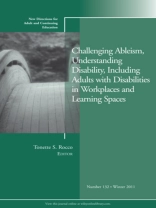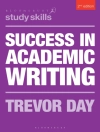Disability can affect adults across the life span–and it isthe one minority group every person could join. This sourcebookaims to broaden the view of disability from a medical or economicconcern to a social justice concern.
It examines practical, theoretical, and research aspects ofdisability–including those who question disabilityclassifications–and situates it as a political and socialjustice concern, technical and pragmatic concern, and personalexperience. The authors present the perspectives of individualswith disabilities, service providers, parents, and teachers andoffer analyses that range from the personal to the broadlypolitical.
This is the 132nd volume in this Jossey Bass highereducation quarterly report series. Noted for its depth of coverage, this indispensable series explores issues of common interestto instructors, administrators, counselors, and policymakers in abroad range of adult and continuing education settings.
Tabela de Conteúdo
EDITOR’S NOTES 1
Tonette S. Rocco
1. Shifting Lenses: A Critical Examination of Disability in Adult Education 3
Tonette S. Rocco, Antonio Delgado
This chapter presents concepts and theories from disabilitystudies useful for a critical examination of disability in adulteducation.
2. Getting to Know You: The Prospect of Challenging Ableism Through Adult Learning 13
Margaret A. Mc Lean
This chapter examines the role of contact and relationship inchanging ableist beliefs and concepts about disability.
3. Conducting Research with the Disability Community: ARights-Based Approach 23
Kelly M. Munger, Donna M. Mertens
This chapter explores the philosophical and theoreticalframeworks that are useful for the conduct of research with peoplewith disabilities.
4. When the Black Dog Barks: An Autoethnography of Adult Learning in and on Clinical Depression 35
Stephen Brookfield
The author relates his personal learning journey to discoverhow best to cope with clinical depression.
5. Alterity: Learning Polyvalent Selves, Resisting Disabling Notions of the Self 43
Wayland Walker
This chapter queries how one type of humandifference–alterity, the experience of multiple distinctconsciousnesses or ‘alters’ by one person–ispathologized in American culture.
6. Learning and Adaptation After Diagnosis: The Role of Parent Education 53
Thomas G. Reio, Jr., Sandra L. Fornes
The authors explore their learning and adaptation afterdiagnosis of their own children’s disability and offersuggestions for navigating the resources available to parents.
7. Challenges and Opportunities of Operation Enduring Freedom/Operation Iraqi Freedom Veterans with Disabilities Transitioning into Learning and Workplace Environments 63
Fariba Ostovary, Janet Dapprich
An overview of issues related to transitioning from themilitary to civilian workplace and learning environments ofdisabled military servicemen/women is presented in thischapter.
8. Revisiting Debates on Learning Disabilities in Adult Education 75
Alisa Belzer, Jovita Ross-Gordon
In light of the current policy emphasis on evidence-basedinstruction, this chapter discusses two recent publications onadult learning disabilities that view it as largely a cognitivedisorder and fail to attend to adult learning theory and theimportance of a socio-cultural perspective.
9. Americans with Disabilities Act as Amended: Principles and Practice 85
Lorenzo Bowman
This chapter reviews the impact of amendments and regulationsthat have updated the ADA in its twentieth year with an emphasis onemployment and adult and higher education.
10. Moving Forward: Two Paradigms and Takeaways 97
Tonette S. Rocco
This chapter reviews the major themes discussed in the textregarding disability and presents takeaways for adult education
Index 103
Sobre o autor
Tonette S. Rocco is a professor and program leader in the adult education and human resource development graduate program in the Department of Leadership and Professional Studies, and the director of the Office of Academic Writing and Publication Support at Florida International University.












